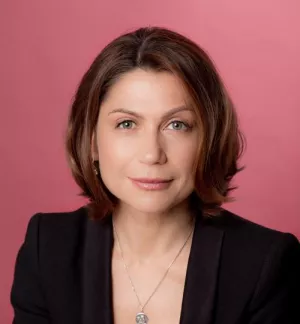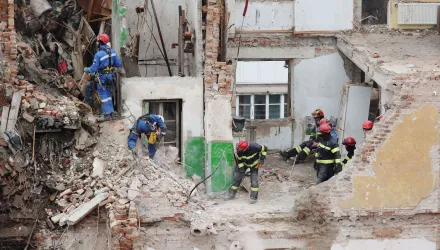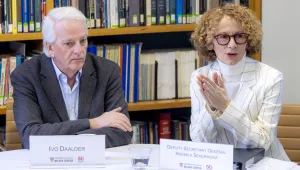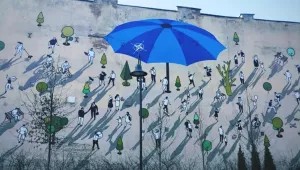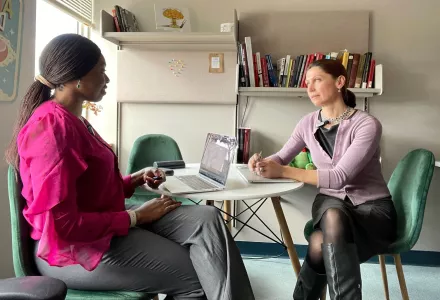
Editor’s Note: Mariana Budjeryn is a Senior Research Associate at Harvard Kennedy School's Belfer Center. She works with the Project on Managing The Atom (MTA), a nuclear policy hub at the Belfer Center. Her work and research focus on the history of post-Soviet nuclear disarmament, Soviet disintegration, and the fate of the Soviet nuclear armaments in Belarus, Kazakhstan, and Ukraine. She recently published the book Inheriting the Bomb which focuses more squarely on the history of Ukrainian nuclear disarmament.
Belfer Communications Fellow Ada Ezeokoli interviewed Dr. Budjeryn on her perspectives regarding the Russian-Ukraine conflict one year on, and her thoughts on the year to come. An edited transcript follows.
Ada Ezeokoli: Congratulations again on publishing your book. As we reach the one-year anniversary of this conflict, can you share from your perspective how Ukrainians on the ground are thinking and feeling about this conflict right now?
Mariana Budjeryn: I think what’s important to understand is that for Ukrainians this is an existential war. This is an existential fight. I think maybe early on there was some disbelief in exactly what sort of campaign Russia had started against Ukraine. But there was a hope that perhaps even with this fully fledged military campaign - there was room for some settlement or negotiations.
But that hope ended with the revelations of war crimes and indiscriminate killing of civilians and wiping out people on the list of Ukrainian intellectuals and activists, as well as the kidnapping and the removal of the Ukrainian children, the institution of Russian language, and Russian schooling programs in the occupied territory.
So, it is a concerted effort to wipe out the Ukrainian people as a nation, as a culture, as a separate entity in the world, not just the physical extermination but an extermination of identity. Mr. Putin has been saying this all along. We perhaps dismissed it as some propaganda and rhetoric, but it seems that he really does feel that Ukrainians don't have a right to be a separate people, that unless they merge with the Russians and stop pretenses of wanting to be a separate subject of international relations in history, he will wage war. In that sense, this struggle is very much an existential struggle for Ukraine.
Ukrainians are convinced that any ceasefire will only push this war to the next generation. So, if we cave in and negotiate a settlement, it will only freeze the conflict, not solve it. It will only allow Russia the time to regroup and come back with a renewed effort. As long as Russia is the kind of state it is now, Ukraine has an existential threat on its borders.
AE: You visited Ukraine over Christmas. What were people there thinking about what's happening and about how the external world is seeing this?
MB: There's a general appreciation and gratitude towards international solidarity, at least western solidarity, that has been extended to Ukraine. Although perhaps there is a bit of a frustration with the pace of armament deliveries and decisions about armaments.
One retired Ukrainian general I talked to, someone I know from interviewing for my research, said that as a military man he understood why the West is doing what it’s doing. They have to be cautious. There is a risk of nuclear escalation that has to be taken into account. But this caution costs Ukrainian lives. So, while these things are deliberated in Ramstein or in Washington, it just costs more lives. We don't know the numbers exactly, but Ukrainians are taking heavy casualties in this war.
Another amazing thing that's going on in Ukraine is that the war and the resistance is really a national effort. Everyone is contributing in some way. The government is doing one thing, but the civic engagement and the spirit of resistance is really something perhaps unprecedented.
And in a sense, being there was extremely inspiring because you see that effort, you see people volunteering and contributing in many ways, and it brings the best out of people. So, it's like Dickens said, it's the worst of times, but it's also the best of times.
AE: We've heard of fighting around the nuclear power plants in Ukraine, and this has been a major concern to many. What do people in Ukraine think about this? Are you more or less concerned about a potential nuclear incident with the reactors than you were earlier in the conflict?
MB: I'm very concerned about the nuclear safety and security at the Zaporizhzhia nuclear power plant that's occupied by the Russian forces, but also at the other three operating nuclear power plants in Ukraine. For an operating nuclear power plant to find itself in the middle of a war zone is really an unprecedented occurrence, and we're just grappling now with all the challenges that are associated with it. There are, of course, technical challenges because none of the sophisticated safety and security systems at the nuclear power plant are designed for this kind of threat.
There is also an unprecedented threat to the human aspect of operating a nuclear power plant when its operators, who already have the highly demanding job of operating a reactor safely, are doing so under incredible physical and psychological duress when people with guns are in their operating rooms.
A third point of concern is the fate of the other three Ukrainian power plants amid a constant barrage and attack on the Ukrainian electrical grid. Nuclear power plants rely for their safe operation on a reliable supply of offsite power. When that power goes down and the electrical grid is damaged enough where it's difficult to restart it, we're looking at serious security concerns for the other three power plants under Ukrainian control.
Even though we have a very sophisticated and well-developed institutional structure for safely managing nuclear power in the world, it's simply not up to the task in the case of what's going on in Ukraine today. This is not to say that the International Atomic Energy Agency (IAEA) and Director General Rafael Grassi have not been putting their best foot forward in the situation. They deserve many accolades and gratitude for how proactively and creatively they have tackled this issue. Yet we see the very real challenges, for instance of demilitarizing the Zaporizhzhia nuclear power plant. No single institution or actor has the kind of political leverage and tools to secure the plant.
AE: There have been concerns that Russian president Vladimir Putin may resort to the use of nuclear weapons in the war. Russia's defense minister has said that the option is only on the table to deter a nuclear attack. How concerned are you and how concerned are people in Ukraine about this possibility?
MB: There's of course the immediate concern over Russia's nuclear use in Ukraine, with numerous nuclear threats issued by Russia over the past year. My other concern about the nuclear dimension of this conflict is its impact on the broader global nuclear order.
The war offers evidence to support the view that nuclear deterrence, the use of nuclear threats, works. Russian nuclear threats and the existence of nuclear weapons in Russia, its willingness to conjure them up in a war, seems to have worked to restrain the conflict, and has induced caution in Western support. Every weapon system that has been delivered to Ukraine is considered very thoroughly for its potential for escalating - which takes more time and delays that support. It's a testament to the working of nuclear deterrence that a year on the conflict is contained to the original territory of Ukraine and the original two belligerents, Ukraine and Russia. No new parties have joined the fray. And certainly a big part of that is a justified concern that NATO cannot enter into direct conventional conflagration with a nuclear armed Russia.
Concomitantly, the war and the circumstances under which it has erupted seem to be a blow to the non-proliferation regime, not least in view of Ukraine's own history of nuclear disarmament and security assurances that Russia, along with the United States and the United Kingdom, pledged to Ukraine, including commitment to respect its territorial integrity and its sovereignty and not to use any force or threat of force, not just nuclear threats. Russia has blatantly violated these commitments.
So, the optics of the situation are simply awful for nuclear non-proliferation. To say that, well, the country had a nuclear option, it gave up nuclear weapons, transferred them to Russia, only 25 years later to be invaded by that country, under the shadow of nuclear threats to prevent assistance to Ukraine. These optics suggest very unfavorable lessons for nuclear nonproliferation.
AE: Where do you see this conflict a year from now?
MB: Both sides right now are gearing for a major offensive and counter offensive. In fact, the Russian offensive in the Donbas seems to have already started. The next couple of months will be critical in shaping the battlefield for the rest of the year. It's a grinding war of attrition on both sides with very unequal resources.
But what we are learning is that the software of warfare is just as important as the hardware of warfare. Right now, the software has been favoring Ukraine. I think it will be important to keep that going, to play to Ukraine's strength and to keep the Western assistance going, to give Ukraine tools to leverage its strength in that software of warfare and keep a keen eye on what's going on inside Russia and the stress that the war has brought upon that society.
I think we'll see a lot more losses on both sides and a lot more commitment in money and that the stolid support from the West might become harder to sustain as the time goes on. In the resolution of this war it will never be just one thing, but a combination of many factors.
AE: Was the software of warfare, especially on the Ukrainian side, a tactical decision made at the beginning?
MB: What I mean by the software of warfare is the organization of the military, how soldiers are treated, quality of command, communications, coordination between units and the general morale. Military analysts that have visited and spent some time with the Ukrainian troops say that's one of the marked differences from the way the Soviet organizational culture had been. Ukrainians have made progress, at least in that sense, towards western organizational culture, where they value their own people, their own soldiers. They don't treat them like cannon fodder. Lines of command are respected and observed. But it's not such a highly hierarchical structure, it's not as rigid, and you don't have to be afraid to speak truth up the line and communicate the real situation. And that makes generally for a much healthier military organization.
We've seen that the Russian army fights very much still like the Soviet army did. It takes a toll on the situational awareness as a military organization if you don't listen to your people on the ground or they are afraid to tell you the truth from the front lines because they will be punished for it. This obvious difference in military culture might have its own effect on how the war is prosecuted and fought. But this is not to obliviate the fact that Russia has a huge superiority in the number of weapons and mobilized troops. Despite inspirational statements and addresses by Zelensky, military people on the ground understand that even if the Russians are poorly equipped and even if they're cannon fodder, the difference is that quantity has its own quality. Russia is still capable of inflicting a lot of damage on Ukraine.
AE: What would you ask the international community to pay attention to over the next year if there is to be progress toward ending this conflict?
MB: First and foremost, I would thank them all for their support that has been incredibly generous and very much appreciated. And then I would simply urge them to understand a little better the nature of the Russian regime and calibrate what is possible and what is not possible based on a better understanding of that regime. It's not just another interstate war where each side has legitimate concerns and they're just using military means to achieve them.
It's a regime that thrives on the weakness of their opponents rather than on their own strengths. So anytime you show a sign of weakness, anytime you show a crack, this is what they're going to leverage and that's what they're going to use against you. So, standing together, holding ranks, showing unity and solidarity is the best the international community could do in this situation, and appreciate that Mr. Putin has a very high tolerance for risk.
AE: What would you say to the Russian people?
MB: I would urge them not to surrender the definition of what Russia is and what it could be to one man and to a group of his cronies that have monopolized that discourse. Every people deserve a country they could be proud of, and now the Russian people don't have a country they could be proud of. They should not give up the right to define their own nation and to define its role in the world, they should not relinquish this right to someone who's a very nefarious person with very nefarious aims.
Ezeokoli, Ada. “Mariana Budjeryn – On the War and Its Impact in Ukraine.” Belfer Center for Science and International Affairs, Harvard Kennedy School, February 23, 2023




